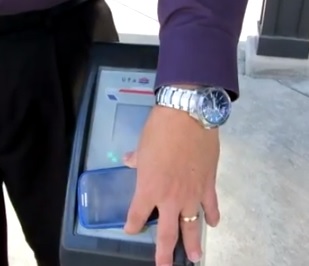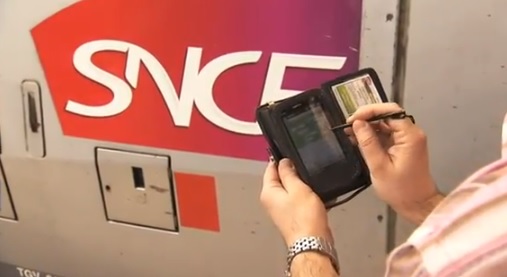The carrier backed digital wallet has just tied up a number of contracts to help its expansion across the nation.
Isis, the mobile payments wallet that is backed by three of the leading carriers in the country has recently announced that it will be going nationwide before the end of the year and it has just tied up a number of important contracts ahead of that rollout.
The announcement is following the pilot trials that have been held at Salt Lake City and in Austin.
The mobile payments wallet has partnered up with Amex, and Chase. The most recent partnership is with Chase, so that their Freedom, Sapphire, Slate, and JP Morgan Palladium cards will be supported by the service. Isis has already reached similar deals with both American Express as well as with Capital One. Once the cards have been loaded into the Isis app, they can be used for completing transactions at any retailers that accept this form of payment.
The mobile payments wallet from Isis is based on NFC technology.
 This means that in order to make mobile payments through the app, the user simply has to tap the device against an NFC technology enabled point of sale terminal. That said, it has been acknowledged by many industry experts that the adoption of devices that feature this technology remains quite slow. Moreover, there is a great deal of confusion among consumers regarding which devices do and do not have NFC technology. Moreover, Apple has not yet adopted this tech at all in any of the devices that it has released.
This means that in order to make mobile payments through the app, the user simply has to tap the device against an NFC technology enabled point of sale terminal. That said, it has been acknowledged by many industry experts that the adoption of devices that feature this technology remains quite slow. Moreover, there is a great deal of confusion among consumers regarding which devices do and do not have NFC technology. Moreover, Apple has not yet adopted this tech at all in any of the devices that it has released.
It has been suggested that Isis may have a contingency plan that will help to boost its initial traction by holding off its primary focus as a mobile payments service and focusing on the other elements of the wallet app, such as loyalty rewards and smartphone friendly couponing. These have been important drivers in mobile commerce, so it could be that they can make all the difference in boosting the popularity of the app.
This most recent news of the mobile payments partnership with Chase has only managed to open more doors for Isis, as it grows the number of cards that it can support.
Soon, passengers on the railway networks across France will be able to use smartphones to pay for fare.
It has just been announced that the TGV trains in France will now be accepting mobile payments from passengers who will be able to use wireless systems to pay for their travel fare.
The railway operator, SNCF, in France, has adopted a state of the art transaction system compatible with wireless devices.
According to the latest news, the mobile payments system for the trains will use technology from VeriFone Systems, a tech firm from California. This will let a mobile device with the right app to be used to purchase railway tickets. The original deployment of handheld devices started back in April and by the time August is complete, it is believed that there will be 12,000 units deployed across the system.
The mobile payments system is comparable to ones that have been used in several other European countries.
 The mobile payments devices being deployed across the world recognized high speed TGV trains in France will accept both domestic and international EMV card transactions. They will also be able to process the sale of the tickets and provide receipts and information services for the train riders. The gateway service at VeriFone collects and routes all forms of electronic transactions and also make it possible to use both the traditional type of card and contactless, smartphone, and online transactions.
The mobile payments devices being deployed across the world recognized high speed TGV trains in France will accept both domestic and international EMV card transactions. They will also be able to process the sale of the tickets and provide receipts and information services for the train riders. The gateway service at VeriFone collects and routes all forms of electronic transactions and also make it possible to use both the traditional type of card and contactless, smartphone, and online transactions.
According to the SNCF department director for train information systems, “VeriFone’s unique managed payment solution makes it possible for SNCF to further improve efficiency and productivity on our trains by adding on-board payment to our mobile solution.” She added that “Mobile payment further enhances passenger convenience and is a natural complement to existing capabilities of access to real-time information such as train schedules and seating availability.”
Similar mobile payments tools have been seen in other countries over the last few months, such as Turkey and Spain. Neither of these have used VeriFone technology, but they are proving to be popular among their passengers. Turkey’s service began in April, while the offering in Spain began in May.
 This means that in order to make mobile payments through the app, the user simply has to tap the device against an NFC technology enabled point of sale terminal. That said, it has been acknowledged by many industry experts that the adoption of devices that feature this technology remains quite slow. Moreover, there is a great deal of confusion among consumers regarding which devices do and do not have NFC technology. Moreover, Apple has not yet adopted this tech at all in any of the devices that it has released.
This means that in order to make mobile payments through the app, the user simply has to tap the device against an NFC technology enabled point of sale terminal. That said, it has been acknowledged by many industry experts that the adoption of devices that feature this technology remains quite slow. Moreover, there is a great deal of confusion among consumers regarding which devices do and do not have NFC technology. Moreover, Apple has not yet adopted this tech at all in any of the devices that it has released.
 The mobile payments devices being deployed across the world recognized high speed TGV trains in France will accept both domestic and international EMV card transactions. They will also be able to process the sale of the tickets and provide receipts and information services for the train riders. The gateway service at VeriFone collects and routes all forms of electronic transactions and also make it possible to use both the traditional type of card and contactless, smartphone, and online transactions.
The mobile payments devices being deployed across the world recognized high speed TGV trains in France will accept both domestic and international EMV card transactions. They will also be able to process the sale of the tickets and provide receipts and information services for the train riders. The gateway service at VeriFone collects and routes all forms of electronic transactions and also make it possible to use both the traditional type of card and contactless, smartphone, and online transactions.